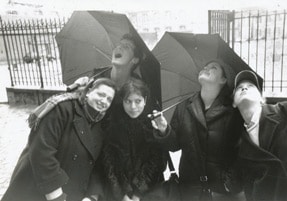| I was in Paris for a mere six weeks when I started craving pancakes. Not the French crepe. A big fat American pancake with butter, maple syrup, and a heaping of fresh bananas. Thankfully, Paris with its sizeable American expat community and being the cosmopolitan city that it is, had its share of American restaurants. So my friends and I were able to get our fix.
It was a funny thing being an Indian American in Paris. In America, I always considered myself Indian. The American part was just a given. Just a place my parents had chosen to immigrate. Like many other minorities, my family considered themselves part of their respective ethnic group. People not Indian were referred to as “American.” I always considered myself different from my friends. They were just “white.” When people would ask “What are you?” or “Where are you from?” I would unequivocally state “Indian” or “India.” It was a given that we were all American (or, in my case, from New Jersey). It was clear they were asking about my ethnic origins.
But that all changed when I moved to Paris in my junior year of college. Now when people asked me where I was from, I found myself saying “America,” leaving the “India” part out. In the context of living in France and speaking American accented French, it was only normal that people wondered what country I was from. I couldn’t say India, because well I wasn’t really from there. I didn’t have an Indian accent and I didn’t dream about all the Bollywood movies I was missing. Instead I found myself counting down the days until the latest Brad Pitt movie arrived in Paris or wishing they had the current season of Friends on TV instead of the previous one. It was an odd thing after years of hearing my parents referring to other people as “American,” that here I was calling myself American. Should I say “Indian American”? I wondered. But no one was asking my ethnicity. They were asking where I was from. It seemed like an odd fact to suddenly throw in. “Where’s your accent from?” “America. But I’m really Indian.” No that sounded awkward at best. Surrounded by cheese, croissants, wine, and a huge dose of homesickness, I found myself turning not to Indian culture for comfort, but American. I craved football and cheerleaders, Bon Jovi, lazy days at the shore and salt water taffy. Sure sometimes I found myself jonseing for some fresh rotis and bhindi, but a onetime jaunt to an Indian restaurant erased that idea from my mind forever. I realized what I wanted was not good old Indian food (which by the way is not so great in Paris), I wanted my mom’s Indian food. The comfort lay not in Indian food, but in the fact that it was mom’s cooking. I found myself trekking to the American grocery store to stock up on American goodies like peanut butter and cranberry juice.
It wasn’t just all about my stomach either. When I traveled throughout Europe locals were constantly fascinated by my American accent, with one person even exclaiming “You sound just like you’re from 90210!” The valley girl in me took it as a compliment. Politics was more of the same. I moved to Europe around the time the Bill Clinton/Monica Lewinsky scandal blew up, meaning that everyone and their mother wanted my opinion on the mess and why Americans were so uptight. Conversely no one asked me about the politics of the Hindu nationalist parties (although I did get a few questions about Hindu/Muslim relations). Being patriotic toward America is not something that’s typically encouraged by Indian Americans (at least not where I grew up). My parents celebrated the requisite American holidays like Thanksgiving and Independence Day, but there was certainly never a sense of patriotism. It was more of an excuse to invite their friends over and drink. But living abroad I wondered why. Are Indian Americans so eager to preserve their heritage that they’re hesitant to celebrate the culture of their new found home? Should we not be proud of our new home? Or do our parents just not feel the same way we do? Perhaps in their hearts they will always be Indian first and American second. After all they still get excited about the Indian national anthem and sing it with a fervor I reserved for belting out cheers on the football field.
My mom had always looked at American teenagers and referred to them as those “Americans” with a look of disgust on her face. But in reality she had an American daughter. Who like every other American teen liked grunge music, getting tipsy, boys, smoking weed when no one was looking, and hanging out at the mall. Yep I was American through and through. A year later when I moved to Ireland, I had accepted my “Americaness” as an essential part of me. I relished singing cheesy American pop music to my coworkers and peppering my sentences with “like” and “totally.” Living in another country taught me how much I really do love being American. Fireworks, BBQs, the commercialism of Christmas, I loved it all. On the flip side, I was equally proud of my Indian heritage poking fun at the blandness of typical Irish fare and announcing my desire for some “dot head” food. My new fellow American co-worker Dave announced to any local that would listen that he was Irish and proud of it. He had always considered himself Irish, growing up in a close-knit Irish-Catholic household even though no one in his family had been to Ireland since the great potato famine. However after a few days of hearing Dave’s boisterous voice, political viewpoints, and predilection for southern 60’s rock, he was quickly corrected by Caroline Murphy, the resident Irish girl in our motley crew of foreign workers. “Dave, you’re American.” Yep, guess we all are. |
Red White And Desi

